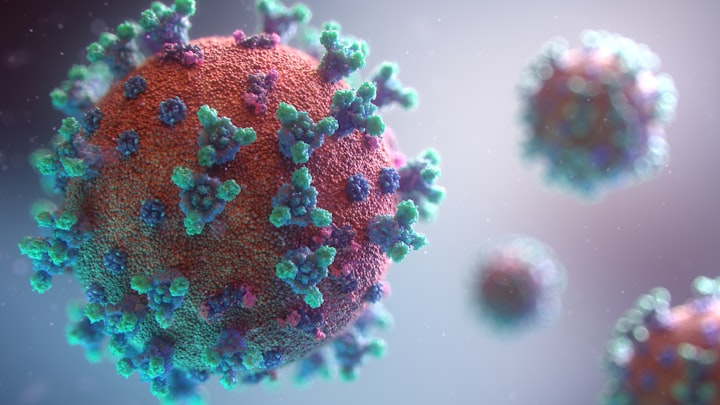This is Not the Last Variant
... and you are a test tube for the virus.

"WHO designates new coronavirus variant "of concern," naming it Omicron"
"Dow logs worst day in over a year as fears over new Covid-19 variant grip global markets"
"Expert: We need "a rapid scale-up of vaccinations," not travel bans"
Here we go again. Just when we were thinking it might be safe to get out of the ... Another variant comes along. I can't blame the virus, it's their job. They are just doing what they were designed to do. If only we were designed to make decisions based on science.
Covid-19 was the original new virus. There are currently 7.674 billion test tubes — human beings — on this planet just waiting to be approached and infected. Viruses see each infection as an opportunity for a promotion. That’s in their job description as RNA (ribonucleic acid) viruses. They want to improve transmissibility. They really do not want to kill their hosts since that means they commit viral suicide. Yet as they become more infectious, they potentially become more deadly and resistant to the vaccines that worked on earlier versions.
When a virus makes copies of itself as it spread through a human petri dish, sometimes only changing a small, almost indiscernible amount. That’s the normal and standard operating procedure. These small changes are called mutations. A virus with more than one new mutation is called a variant of the original virus since it presents a different profile and has a very different impact.
Tracking and identifying new variants are important because they raise important questions about defeating the virus.
· Are people more at risk for getting sick and dying?
· Will the current vaccines still be effective?
· Are there new or different things you should do to keep you and your family safe?
· Will you need a new booster vaccine for your vaccine?
Coronavirus disease — 2019 (COVID-19) is a novel disease — a new variant — caused by the beta-coronavirus severe acute respiratory syndrome — coronavirus-2 (SARS-CoV-2). Variants of Covid-19 have been emerging and circulating around the world from the start of the pandemic. Variants are identified in labs and during epidemiological investigations using a process called sequence-based surveillance.
There is a Variant Classification scheme developed by the United States WHO that defines three classes of variants:
· Variant of Interest (VOI)
· Variant of Concern (VOC)
· Variant of High Consequence (VOHC)
There is a long and growing list of Variants of Interest and Concern. The big problem is the VOHC. Originally variants were given alphanumeric identifications. The long and growing list includes B.1.1.7, B.1.351, P.1, B.1.427, B.1.429, P1 and P2. Epidemiologists at the World Health Organization (WHO) have started identifying variants with Greek symbols and names to help avoid confusion about the ones they are discussing — Alpha, Beta, Epsilon, Gamma, Eta, Iota, Kappa, Zeta, and Delta. That last one — Delta — quickly became a VOHC.
It's about to be replaced by Omicron.
According to the Centers for Disease Control (CDC) a VOHC is “a variant for which there is evidence of an increase in transmissibility, more severe disease (e.g., increased hospitalizations or deaths), significant reduction in neutralization by antibodies generated during previous infection or vaccination, reduced effectiveness of treatments or vaccines, or diagnostic detection failures.
Possible attributes of a variant of concern:
· Evidence of impact on diagnostics, treatments, or vaccines.
· Widespread interference with diagnostic test targets.
· Evidence of substantially decreased susceptibility to one or more classes of therapies.
· Evidence of significantly decreased neutralization by antibodies generated during previous infection or vaccination.
· Evidence of reduced vaccine-induced protection from severe disease.
· Evidence of increased transmissibility.
· Evidence of increased disease severity.
The Covid-19 Delta variant — originally called “the Indian variant” — was first detected in February 2021 in India causing a huge spike of COVID-19 infections in that country. Two months later in April, the variant was sequenced in only 1% of the CDC samples around the world. Only three months later, it represents over 6% of the sequenced samples according to the most recent data from the US CDC. The variant has spread rapidly and has now been identified in 74 countries, on every continent apart from Antarctica.
The latest variant Omicron has already popped up in South Africa, Hong Kong, Israel, and the UK. That really means it's already everywhere. The panic has already started. If you live in Botswana, Eswatini, Lesotho, Mozambique, Namibia, South Africa, and Zimbabwe you are probably not going to be traveling anywhere soon until we know more about this. And all of South Arica - and soon Africa itself - will be labeled a 'virus variant area". The problem is the virus has no idea where one country ends and another begins. It just has no respect for borders.
The question science needs to quickly answer is how infectious - transmissible - is Omicron, and does it evade our current vaccines. It is providing a cautionary tale for the unvaccinated world. Variants beget variants. This pandemic is not going away any time soon unless we increase vaccinations and gradually take away the opportunity for the disease to continue spreading and mutating. That will mean more lockdowns, stay-at-home quarantines, masking, and social distancing.
There are 24 letters in the Greek alphabet. Omicron is only Number 15.
About the Creator
David Grebow
My words move at lightspeed through your eyes, find a synaptic home in your mind, and hopefully touch your heart! Thanks for taking the time to let me in.






Comments
There are no comments for this story
Be the first to respond and start the conversation.